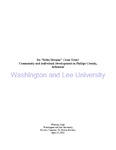Do "Delta Dreams" Come True? Community and Individual Development in Phillips County, Arkansas

View/
Author
Clark, Whitney
Subject
Washington and Lee University, Shepherd Poverty Program
Arkansas
Poverty
Skilled labor
De facto school segregation
Community development -- Economic aspects
Metadata
Show full item recordDescription
Capstone; [FULL-TEXT FREELY AVAILABLE ONLINE] In general, most residents of low-income neighborhoods are unhappy with the impoverished state of their community and can take one of two modes of action to demonstrate their dissatisfaction: exit or voice (Simon 2001:144). Exit refers to the case when members of the community leave and move to different cities; voice is when residents publicly announce their discontent by complaining to authority figures or participating in efforts towards change (Hirschman 1970:4). Different community characteristics can either facilitate exit or promote voice depending on residents' long-term interest in the area and whether or not reforms are made in response to voiced concerns. When there are many barriers to exit people are more likely to use their voice and vice versa. Exit and voice are at the center of the discussion of this paper that essentially aims to determine how people are made better off. Should exit be discouraged by developing the local community and creating geographic ties through personal connections and enhanced resources or should exit be facilitated with programs designed to educate and empower individuals to explore opportunities outside the community? [From Introduction] Whitney Clark